#explore mars
Explore tagged Tumblr posts
Text
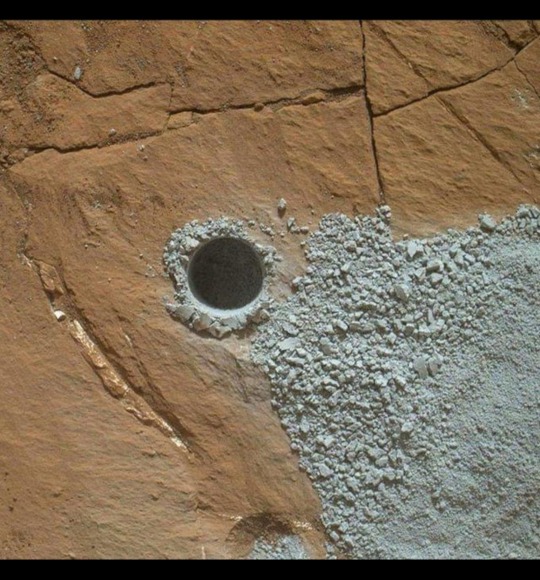
A hole drilled on Mars by Curiosity Rover, one of 36 holes drilled.
#Mars#martian#curiosity#curiosity rover#nasa#space exploration#space#outer space#science#nasa jpl#Jet Propulsion Laboratory#astronomy#perseverance rover#mars mission#Ingenuity#jezero#explore mars#space craft#2001#martian surface#phobos#deimos#mars landing
54 notes
·
View notes
Text
Clearest Image ever taken of Mars’ North Pole. Yes that’s water ice.
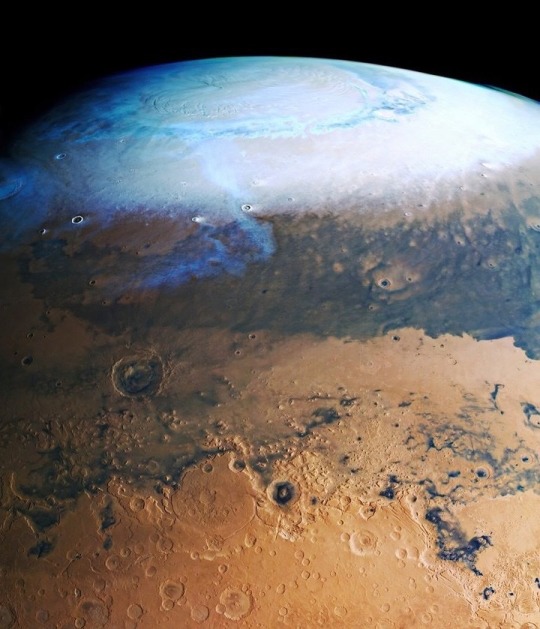
#mars posting#mars planet#water on mars#life on mars#mars#planet mars#astronomy#nasa#astronomers#universe#nasa photos#astrophotography#outer space#astrophysics#nasawebb#hubble space telescope#our universe#the universe#space exploration#space#science#space travel#space science#international space station#astronomy photography#i love astronomy#astronomy facts#astronomy picture of the day#planetary nebula#solar system
2K notes
·
View notes
Text
📍Iceland 🇮🇸
#video#view#paradise#nature#paraiso#natureza#explore#travel#trip#vacation#goals#iceland#islandia#sun#winter#inverno#sol#travel destinations#mountains#beach#praia#waves#ondas#mar#sea#ocean#sky#dark sky
2K notes
·
View notes
Text
When humankind have all but destroyed Earth, can Mars be our new home? bit.ly/44Pk50L
1 note
·
View note
Text
It’s been nearly seven years since Oppy the Mars Rover went to sleep and didn’t wake up and still even the merest thought of it has me crying.
254 notes
·
View notes
Text
Commander Johnson, I-I think I found what or who been stealing our extra spare material supplies
Astronaut Jennifer said in the com as she stared, standing stiff as a board if it weren't for the gravity of Mars making it difficult.
What she was staring at couldn't be human but yet so close and eldritchic- alien like as the inner part of her mind was screaming danger danger, That Is Not A Human Being, Run RUN RUN,HIDENOWHIDENOWNOWNOW
It's look like a adult, a very slim and very tall adult if it weren't for the fact that his skin was tanned with a bit of splash of starlights all over, wearing a suit made of galaxies covered in red Mars rocks, his hair was white, whiter then the clouds on earth, ears pointy and curled a bit as if it wa to shield or reflect to what its was hearing(but they has moved back in a aggressive manner thar remind her of snuffles when threaten) and eyes glows so ominously Neon Green with black instead of white surrounding the iris, splatter of star like freckles that looks like he almost has two pupils mixing into a slits like in each of them.
Teeths razor sharp and thick, as the thing looks like it was growling at her with his body arch over, hands with extra digits of long blacken claws like nails dig into the dirt, hiding all the stuff that the alien had stolen along with a lil head of another mar baby, it weren't for the fact there was no sounds in space, she would've been screaming float running back to her headquarters base.
She was only patrolling the part of the base where they were trying to grow plants in one of the green houses they painstaking made on Mar, but then she saw the glow of unnatural green slipping out of the sealed tight glass.
Curiosity took the best of her as she put on her suit and went to check at that spot is where she find what seem to be a native Mar creature and its baby hoarding all the missing stuffs that they had lost in the base, along with the missing robot, opportunity as the top of it's hoard pile in a makeshift hole(it's a Nest and she has enter this creatures domains) near a small pool full of of oddly frozen water that glowed luminous.
It was a stand off between her and the creature not moving an inch until Jennifer's coms responded back as she flinched, her heart dropping snd face paling dramatically when the creature's ear flick a bit as it heard the static electric device.
"J-J-J-Jennifer, do you copy? I repeat, Do you copy?!?" Commander Johnson spoke a bit frantic.
Unawared of the danger he had put Jennifer in when she flinched, the creature lunged, Jennifer scrambling to turn around and hop/run back into the safety of the base as fast as she could.
Like inspiration for @tinycoded360
#danny phantom#the martian#dp prompt#danny left earth after the nasty explode#he went to mars#and never left#Feral danny#space core danny#gremlin danny#he saw opportunity the space rover and went decide to save it and kept it safe#2037 NASA finds out opportunity is alive again and asked the astronaut coloning on it to find opportunity when they can#all they see in opportunity camera is a glitch mess but opportunity still does it's duty of sending materials to earth#ellie came along with because she wasn't going to let danny exile himself without a exile buddy and got caught up in exploring mars#that she became feral and smaller with Danny as her protector-(papa) who feed her ecto even if the portals on mars are rare and random#to get more nature ecto beside the small frozen water full of it on mars but that for emergencies#de aged ellie#I'll updated more sooner or later
482 notes
·
View notes
Video
tumblr
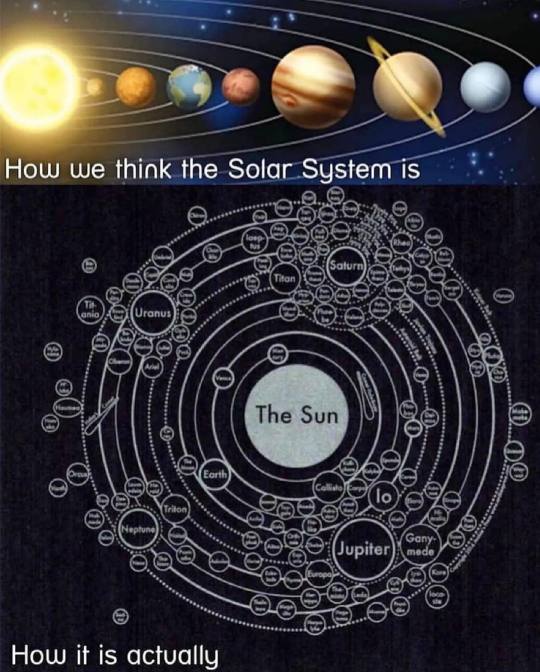
“ The Solar System “ // astro.lust
Music: Interworld - Metamorphosis
#space#planets#sun#earth#moon#mercury#Mars#Venus#Jupiter#Saturn#Neptune#uranus#Pluto#SolarSystem#galaxy#Galaxies#MilkyWay#universe#reels#explore#follow#discover
4K notes
·
View notes
Note
do you have a favourite planet etc?
2K notes
·
View notes
Text










when they look like a lana del rey song 😫
#gnr fic#gnr icons#gnr imagine#guns n roses#gnr x reader#musicians#izzy stradlin imagine#duff mckagan imagine#duff mckagan fanfiction#izzy stradlin#nikki sixx#motley crue#duff mckagan#slash#slash gnr#steven gnr#steven adler#axl rose#axl gnr#tommy lee#mick mars#vince neil#80’s#80s rock#rockstars#lana del rey#explore#Spotify
223 notes
·
View notes
Text
okokok I know people are all making jokes about having Joel’s celestial symbol be a car, but here me out:
What if his was a spaceship? Exploring the universe, going on adventures into uncharted space and time, discovering new worlds all while getting to go fast as heck. I would love to see someone do an interpretation of this.
#wild life#wild life smp#life series smp#wild life spoilers#life series#trafficblr#traffic smp#joel smallishbeans#smallishbeans#the sun#the stars#the moon#the mars#the earth#and the explorer#that sounds cool as heck
166 notes
·
View notes
Text
youtube
Take a trip to our solar system’s red planet—now in immersive 360 video! See the surface of Mars as documented by NASA space missions. Fly through Valles Marineris and the caldera of Olympus Mons, visit the frozen water of the North Polar Ice Cap, and learn about the future of Mars exploration.
#science#amnh#nature#natural history#fact of the day#did you know#mars#space exploration#space#nasa#astronomy#astrophysics#cosmos#universe#360 video#Youtube
132 notes
·
View notes
Text
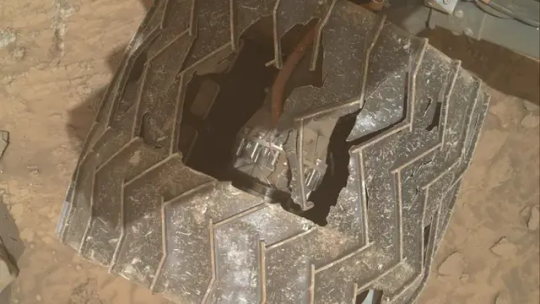
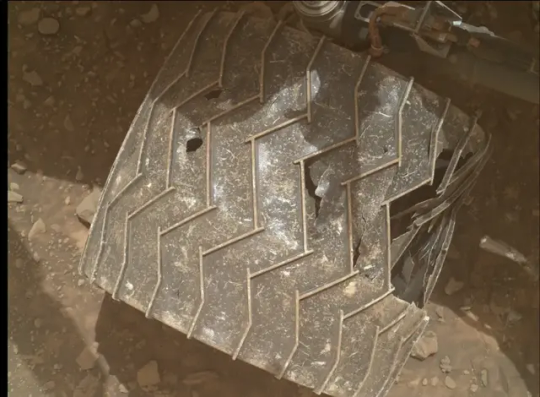
New NASA images reveal giant hole in Curiosity rover's wheel after 12 years of 'abuse' on Mars
Images captured by Curiosity's onboard cameras show several large tears in the tire of one of the rover's wheels. However, the damage does not appear to be slowing the roaming robot down.
Curiosity first touched down on Mars on Aug. 5, 2012 and was initially only expected to last for two years. But the hardy rover has defied expectations and has lasted 4,323 Martian days, or Sols, on the Red Planet, traveling more than 20 miles (32 kilometers) around the Gale Crater, where it originally landed.
However, new photos taken by Curiosity's Mars Hand Lens Imager (MAHLI) and released by NASA on Sept. 24 reveal that the rover's epic journey has taken a toll on the robot's middle right wheel. The images show several large tears in the wheel's heavily scratched tire, including one particularly large hole that reveals the wheel’s inner mechanisms. It is currently unclear when these holes first emerged or if any of the rover's other wheels have suffered similar damage.
The damage may look bad but Curiosity "is still holding up well despite taking some of the worst abuse from Mars," mission operations engineer Ashley Stroupe wrote in the statement.
By Harry Baker.
#giant hole in Curiosity rover's wheel#Curiosity#mars rover#mars#nasa#nasa science#nasa photos#nasa picture of the day#science#space#space travel#space science#space exploration
213 notes
·
View notes
Text
A unique view of Mars and its scarred surface!
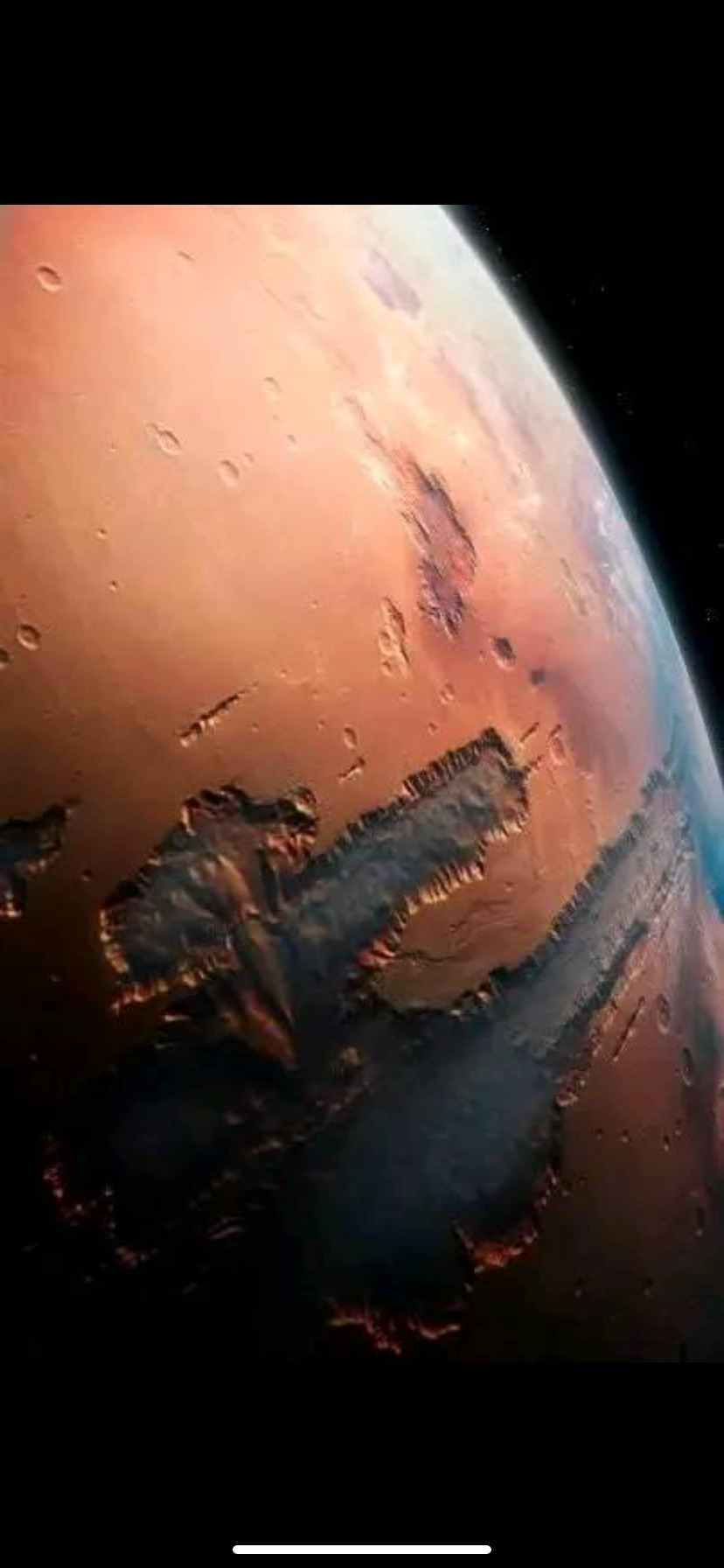
#astronomy#nasa#astronomers#universe#astrophotography#nasa photos#astrophysics#outer space#nasawebb#hubble space telescope#mars planet#mars#planet mars#planetary science#planetary nebula#cosmos#solar system#beautiful earth#i love astronomy#astronomy facts#astrography#astrobiology#space science#space exploration#space#science facts#science#astro community#astro notes#astro observations
615 notes
·
View notes
Text
📍Algarve, Portugal 🇵🇹
#video#paradise#view#nature#paraiso#natureza#explore#travel#trip#beach#ocean#sea#algarve#portugal#pt#br#praia#vacation#adventure#caverna#cave#hidden cave#aventura#waves#ondas#mar
3K notes
·
View notes
Text
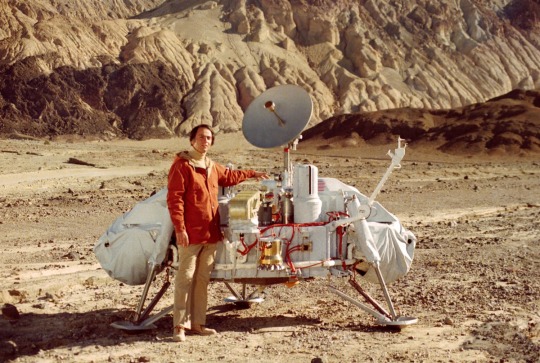
Astronomer Carl Sagan stands in front of a Viking lander mockup in Death Valley, California, c. late 1970s.
#science#technology#astronomy#space exploration#Carl Sagan#NASA#Mars#Viking program#space probe#Death Valley#California#USA#1970s
1K notes
·
View notes
Photo
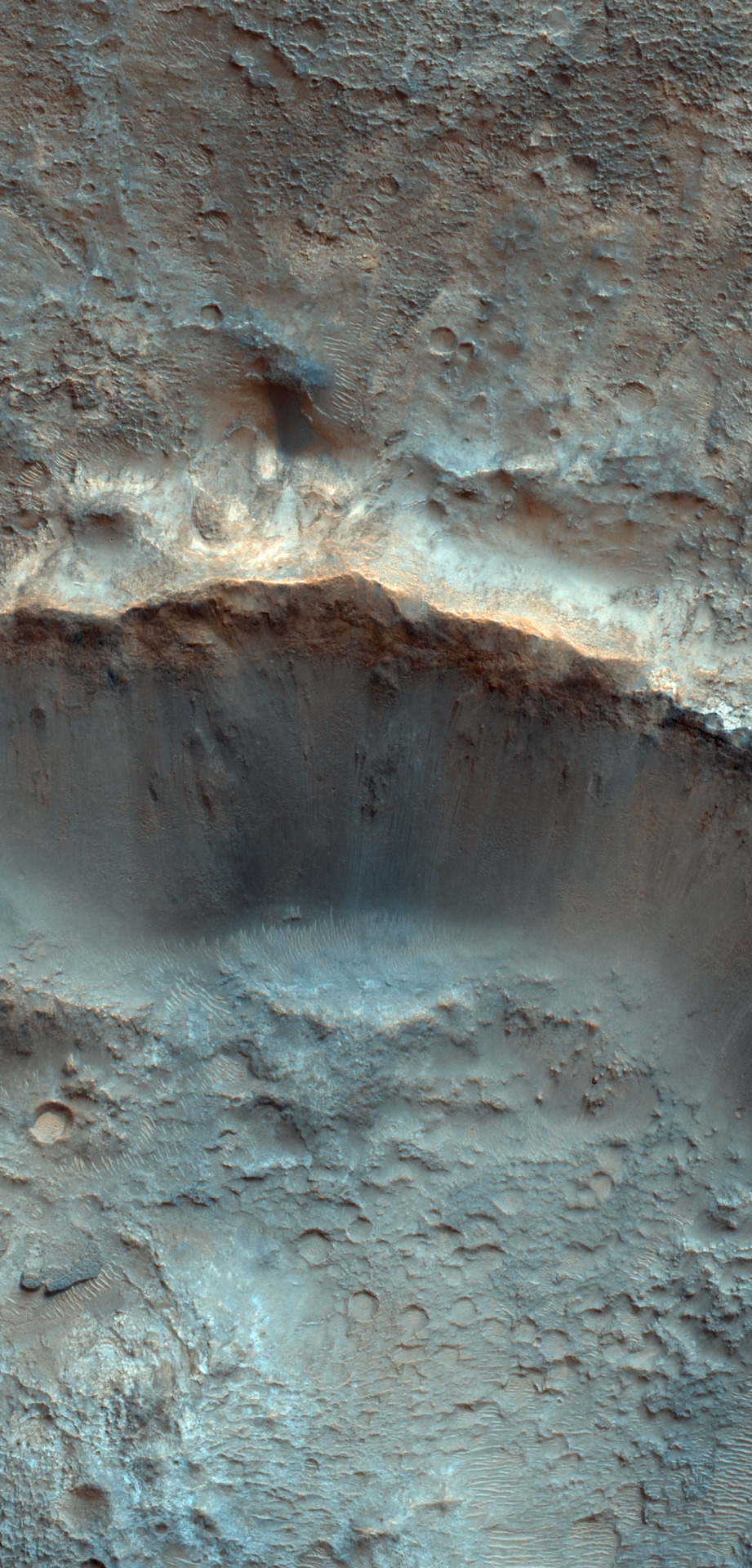

Impact crater on Mars
In the southern highlands of Mars, CaSSIS spotted ancient and eroded craters filled with sediment. This is the case of this relatively old, 15 km diameter crater in Tyrrhena Terra, showing its age in its flattened rim – younger craters have sharper, more defined rims – and the degraded ejecta blanket.
There is a central uplift section to the crater, as well as many smaller craters, which also suggests an advanced age.
Beautiful dark dunes appear in contrast with wind-blown, pinkish ripples winding their way around the terrain.
Like most CaSSIS imagery, the colours in this image are stretched to highlight the diversity of surface composition.
CREDIT ESA/TGO/CaSSIS
#esa#tgo#cassis#space exploration#mars#satellite imagery#planet#solar system#tyrrhena terra#european space agency#elements#landscape#terrain#dunes#dune#crater#craters#geology#nature#science#astronomy#aesthetic#check source for#hi-res version#long post#sorta#space
247 notes
·
View notes